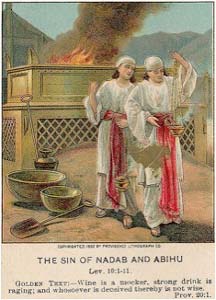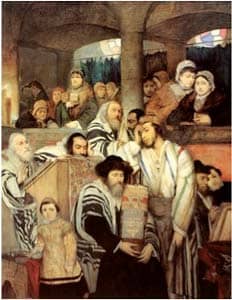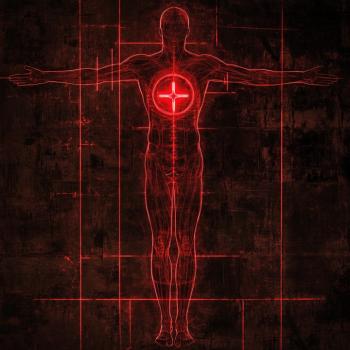By Talia Davis
The parshot for the week ending April 24 is Acharei Mot and Kedoshim. Acharei Mot means "after the death" in Hebrew and they are the fifth and sixth words (and first distinctive words) in the portion. Kedoshim means "holy ones" in Hebrew and is the fourteenth word (and first distinctive word) in that portion. Be sure to check out the cartoons at the end of this article for some great perspectives on these Torah portions.
 We pick up here after the death of Aaron's sons, who were victims of their own passions. So G-d sends Moshe a manual to prevent this from happening again. No longer will the Jews be allowed to let their passions or bad habits get the best of them. There are three sections of this manual -- meat (how to eat when and where), sex (who and when), then atonement for the "oops" moments that are inevitable. See, G-d knows us and doesn't expect us never to make a mistake.
We pick up here after the death of Aaron's sons, who were victims of their own passions. So G-d sends Moshe a manual to prevent this from happening again. No longer will the Jews be allowed to let their passions or bad habits get the best of them. There are three sections of this manual -- meat (how to eat when and where), sex (who and when), then atonement for the "oops" moments that are inevitable. See, G-d knows us and doesn't expect us never to make a mistake.
So, let's start with meat. There can be no blood in our meat. We cannot eat fresh corpses and the slaughter needs to happen at the Temple with a supervisor . . . but wait, there is not Temple any longer! That's right. And so today we have the kosher hecksher where a trained rabbi watches the preparation of the meat to ensure it is done properly.
Next is atonement. This details Yom Kippur, which is a 24-hour marathon of repentance with special clothing and diet. Different offerings representing different sins of the past.
 Lastly, sex. This is a biggie with some clear and obvious prohibitions, like you can't sleep with a sibling, but this is also part of the parsha that is oft quoted in relation to homosexual relationships. Here is my drash. First, the language is clearly referring to men. You can't make the inference that it also applies to women or lesbians in the same fashion. So the language is very important in all of the Torah, and that doesn't change here. The text says you shouldn't sleep with a man as with a woman. Nowhere else does it say you don't do this like you do that. So why here? My theory is that it is reminding us that we can't just throw things around without thought. You can't thoughtlessly do this. It is easy for a man to sleep with a woman but it becomes harder for a man to sleep with a man. Harder in many senses. This is not a simple decision. We have to put thought behind our actions. Don't just take the easy way, be mindful. I don't read this as a condemnation of homosexuality.
Lastly, sex. This is a biggie with some clear and obvious prohibitions, like you can't sleep with a sibling, but this is also part of the parsha that is oft quoted in relation to homosexual relationships. Here is my drash. First, the language is clearly referring to men. You can't make the inference that it also applies to women or lesbians in the same fashion. So the language is very important in all of the Torah, and that doesn't change here. The text says you shouldn't sleep with a man as with a woman. Nowhere else does it say you don't do this like you do that. So why here? My theory is that it is reminding us that we can't just throw things around without thought. You can't thoughtlessly do this. It is easy for a man to sleep with a woman but it becomes harder for a man to sleep with a man. Harder in many senses. This is not a simple decision. We have to put thought behind our actions. Don't just take the easy way, be mindful. I don't read this as a condemnation of homosexuality.
All three are about discipline and order but the Hebrew text, as always when it comes to Hebrew, is open to interpretation. In many of these prohibitions we see G-d reminding us that we are not like our neighbors; we are the chosen people, we are the tested people (the Hebrew word for chosen is bahar but becherah means tested; same shoresh or root), and we cannot go through our lives mindlessly. This wasn't just a reaction to the death of Aaron's sons but a gift of pro-action for our future.
Next is Kedoshim. Kedoshim is special to me. This is my family Torah portion and my bat mitzvah parsha. Kedoshim is the same word as kadosh, which has several meanings -- holy, sacred, special, separate, and different. This is what this portion is about -- keeping Jews holy, sacred, special, separate, and different than others. The parsha begins with kedoshim tihiyu ki kadosh, ani Adonai, elohechem -- you shall be holy, for I Adonai your G-d am holy!
There is a drash that before we were given the Torah at Mt. Sinai, other groups were given the chance to be G-d's "chosen people." G-d enumerated the 613 commandments and every group had a problem with something. Until he got to the Jews. It even says that G-d held the mountain, Mt. Sinai, over the heads of the People of Israel and asked, "Will you accept my commandments?" and we, of course, agreed.
From the start, we had to be something/somebody different than the people around us. We accepted the added responsibility that came with being monotheistic in a polytheistic world and we had to restrict certain behaviors and traditions. Essentially, G-d plucked the Jews from obscurity, but fame comes with responsibilities and those are mainly laid out here. Are you ready for this? Okay, here we go...
- Revere your mothers and fathers (later it says father then mother... order is key in the Jewish texts).
- Keep the Sabbath.
- Do not even think about turning back to idols.
- Don't collect the edges of your fields; leave them for the poor and the stranger.
- Don't steal, lie, swear falsely, or fleece.
- Be fair and pay your labor promptly.
- Don't speak badly about the deaf or put a stumbling block in front of the blind.
- Judge fairly.
- Don't deal disreputably with your neighbors, profit by their blood, or hate them.
- Don't be vengeful or hold a grudge.
- Love your neighbor/friend as you would love yourself.
- Observe all G-d's laws.
- Don't mix breed animals or plant different seeds in one field.
- Don't mix two different types of material in one garment.
- If a man sleeps with someone else's slave woman, he must give up a ram as a guilt offering.
- When you plant a tree, let it blossom and wither for three years without touching it; give the fruit to G-d the fourth year, and then eat of it in the fifth year.
- No blood in your meat.
- No magic (sorry, Harry Potter).
- Leave your sideburns alone (sometimes thought of as the payis part -- you know, the curly side locks).
- Don't cut your skin in grief.
- Don't allow your daughters to be prostitutes.
- Revere G-d's holy place.
- Don't talk to ghosts (What? Yes... no ghost hunters here).
- Honor the elders.
- Honor the stranger in your midst.
- Don't fake weights or measures.




